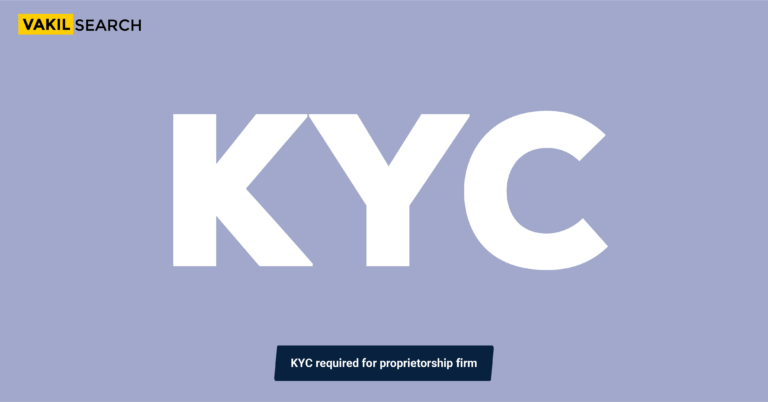: In this blog, we will discuss how one can Calculate GST on sole proprietorship and as well as how one can register for it.
A business that is run by one person is referred to as a sole proprietorship. It typically doesn’t call for registration in the traditional sense. This kind of business form is available to anyone who wishes to establish a firm with less investment.The sole proprietor/owner of the company has complete control over it. This type of business can be chosen by a single person who wishes to start a venture from their home or location with a small investment. The single owner will make the investment for the sole proprietorship business. He suffers all of the company’s losses while also reaping all of the profits. He not only runs the company but also controls it. He can designate employees to run the company, but he will be the only one who owns it.
Sole Proprietorship income Tax Calculation
Numerous small businesses, including supermarkets, salons, boutiques, and retail stores, can be founded as single proprietorship firms. A sole proprietorship business can be started by even small manufacturers and traders. According to current IT laws and in accordance with the slab rates that apply to his taxable income, such a firm is also eligible to obtain the single proprietorship tax deduction, just like any other individual assessee. In contrast, income taxes are assessed at set rates for registered businesses. To Calculate GST on sole proprietorship one should know about tax rates of the following year.
Sole Proprietorship Tax Rates For The AY 2019-20 (FY 2018-19)
The following tables further simplify the various slab rates that help to Calculate GST on sole proprietorship.
For sole proprietors under the age of 60
Income Tax Slabs Tax Rate Health Education Cess for
Up to Rs.2.5 lakh Nil Nil
Rs.2,50,001 to Rs.5 lakh* 5% 4% of Income Tax
Rs.5,00,001 to Rs.10 lakh 20% 4% of Income Tax
Above Rs.10 lakh 30% 4% of Income Tax
*For people with a net taxable income of less than Rs 5 lakh (after deductions), the most recent interim budget practically offered a full tax relief. This is true since the previous cap on the maximum tax credit under Section 87 A has been raised from ₹2,500 to ₹12,500. As a result, a sole owner with net taxable income up to Rs 5 lakhs will now be eligible to obtain a tax refund of up to Rs 12,500 and not be required to pay any of the taxes at all.
For sole proprietors who are above 60 years but below 80 years
income Tax Slabs Tax Rate Health & Education Cess
Up to ₹3 lakh Nil Nil
Rs.3,00,001 to Rs.5 lakh 5% 4% of Income Tax
Rs.5,00,001 to Rs.10 lakh 20% 4% of Income Tax
Above Rs.10 lakh 30% 4% of Income Tax
For sole proprietors above 80 years
Income Tax Slabs Tax Rate Health & Education Cess
Up to ₹5 lakh Nil Nil
Rs.5,00,001 to Rs.10 lakh 20% 4% of Income Tax
Above Rs.10 lakh 30% 4% of Income Tax
In addition to the income tax amount imposed as per the above-mentioned slabs, sole proprietors are also required to pay the surcharge as shown below-
- 10% of the income tax amount and if the total income is in the range of Rs 50 lakhs to 1 crore
- 15% of the income tax amount and if the total income exceeds Rs 1 crore
Another crucial aspect of calculating income tax for a sole proprietorship is that, if the IT return is submitted on time or before the deadline, any losses incurred by the business will be allowed to be carried forward.
In addition, if he doesn’t submit his proprietorship IT return by the deadline, the tax deductions allowed under Sections 10A and B and Sections 80-IA, IB, and IC won’t be taken into account.
When is GST registration for a proprietorship firm Required?
The following circumstances may necessitate the proprietorship firm’s GST registration –
- when annual revenue exceeds 40 lakh rupees
- When a Proprietorship Firm sells the products or services inter-state ( from one state to another state)
- When Proprietorship Firm is doing an eCommerce business.
- When a Proprietorship Firm seeks to claim the purchase’s input tax credit.
- On Voluntary basis
- Proprietorship Firms can therefore apply for GST Registration under the above conditions.
Documents required for GST registration for proprietorship firm
- Proprietor Personal Pan Card Copy
- Proprietor Aadhar Card Copy
- Electricity Bill, Telephone Bill or water Bill of Business Location or Premise or Rent Agreement if the Office is Rented
- Proprietor Personal Bank Statement or the Cancel Bank Cheque or Passbook Front page Copy (Remember if you have already a current bank account on the Firm Name then instead of saving bank account provide a current bank account for the same)
- Passport Size Photographs of the Proprietor.
The sole proprietorship registration process is voluntary and not mandatory. In India, establishing a sole proprietorship is not legally needed, but you may need to obtain specific licenses, such as those for GST registration or MSME registration.
Procedure for GST for Proprietorship Firm
- To Register Proprietorship Firm As there is no separate PAN Card for the Proprietorship Firm, all you need to do is sign in to the GST Official Website in India and complete the registration form using your own PAN card.
- To obtain GST Registration for a Sole Proprietorship and the required Documents, you may also contact a professional legal service or a GST Consultant.
Compliance for Proprietorship Firm after GST Registration?
Once you enroll as a proprietorship in the GST Registration, there are compliance requirements that you must adhere to in order to avoid having your registration cancelled.
As a proprietorship firm, you must submit a monthly GST Return Filing and pay taxes. There is a penalty per day if you skip it.
The ITR-3 form must be submitted by people running sole proprietorship businesses in India. Additionally, it may be submitted electronically by the proprietor using a digital signature.
A sole proprietorship business has until July 31st to file its income tax return if an audit is not necessary. The deadline to file an IT return for a sole proprietorship is September 30th, in the event that the Income Tax Act demands an audit. Please be aware that a sole proprietorship business IT audit requires the services of a licensed chartered accountant.
Conclusion
With the above-mentioned information, we hope that you have understood how to Calculate GST on sole proprietorship as well as how to register for it. If you are also a new sole proprietorship firm looking for help to calculate GST then our experience business advisors at Vakilsearch can be your best bet.










